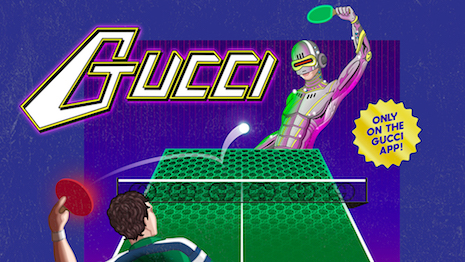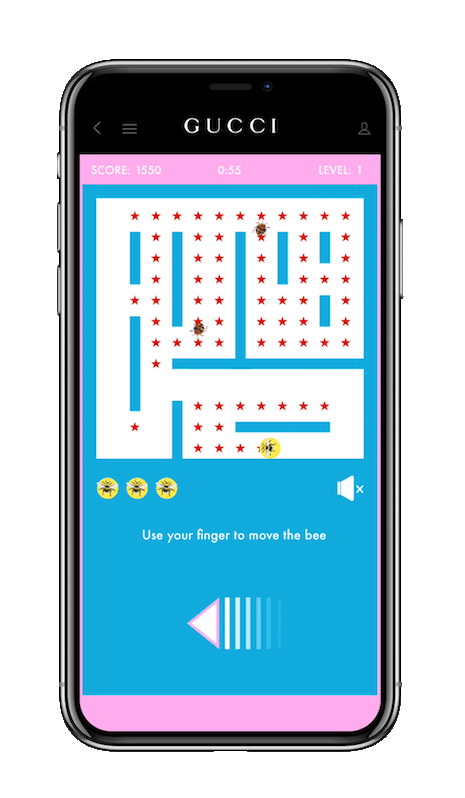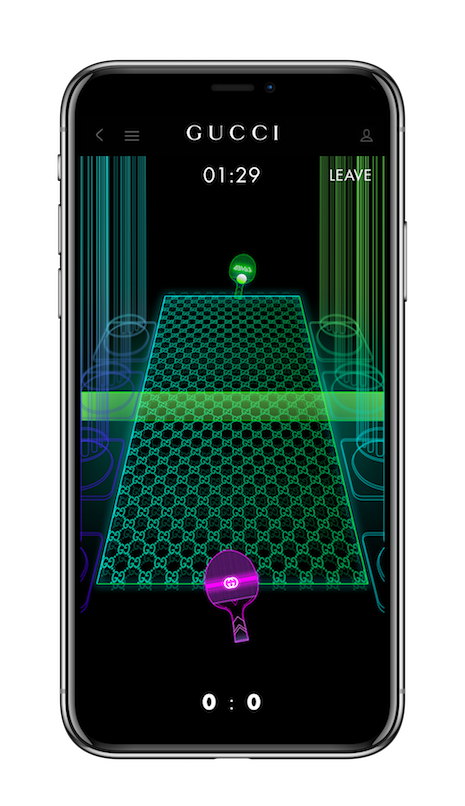 The Gucci Ace game is playable within the brand's app. Image courtesy of Gucci
The Gucci Ace game is playable within the brand's app. Image courtesy of Gucci
Italian fashion house Gucci is looking to engage consumers around its products and brand by launching a series of games within its mobile application.
Classic games of the 1970s and ’80s have inspired the Gucci Arcade, bringing retro-style challenges to a modern, portable platform. Putting this focus on entertainment and competition, the arcade enables consumers to play and compare their scores with others, creating a community among Gucci’s fans.
"Luxury brands that fail to evolve with the times are destined to find themselves irrelevant in the emerging cultural milieu," said Scott Forshay, senior managing consultant of mobile and emerging technologies at IBM iX, Austin, TX.
"Gucci are on a seemingly never-ending quest for engagement with their existing brand loyalists while always paying careful attention to catering to the legions of new and younger audiences looking to evolve with the label," he said. "The success the brand has found in attracting a younger demographic is evident in its strong presence in contemporary popular culture and with Gen Z audiences who, although perhaps not immediate consumers, will form the foundation of the brand’s continued longevity.
"Incorporating the Arcade section of its application illustrates the brand’s excitement to engage with younger audiences with energy, vitality and fun. Of course the element of commerce is ever-present, but the brand is cautious to ensure it takes a backseat to genuine engagement on terms emerging audiences can relate to. This degree of authenticity and a desire to relate should endear the label to emerging audience segments and help safeguard the longevity of its brand relevancy."
Mr. Forshay is not affiliated with Gucci, but agreed to comment as an industry expert. Gucci was reached for comment.
Playing games
Unlike a lot of the other features of the Gucci app, consumers need to log in or create an account to access the Arcade.
The Gucci Arcade is debuting with two games.
One of the games featured is the Gucci Bee, which debuted earlier within the app. This branded version of a Pac-Man-style game challenges consumers to use their finger to navigate a bee through a maze.
The game objective is to collect all of the red stars on the map before a timer runs out. While moving through the maze, players have to avoid bugs, which will end the bee’s life.
Gucci Bee. Image courtesy of Gucci
Bees are a common motif in Gucci’s designs, appearing on everything from jewelry to leather goods.
Gucci Bee is played alone, but a new game opens up the opportunity for consumers to compete against each other.
Dubbed Gucci Ace, the game is based around the sneaker of the same name. Recreating the idea of table tennis, the players move and tap paddles to move a ball on a Ping-Pong table.
Players can opt to connect to one of their friends or be matched with a random player.
The look and feel of Gucci Ace changes as the player moves through three different levels.
At the start of the game, it resembles a retro 8-bit game, but it eventually morphs to look more similar to modern console gaming. The third level presents Gucci’s take on futuristic games.
Gucci Ace includes a futuristic level. Image courtesy of Gucci
"The Gucci Arcade is clearly intended to take fans back in time," said Douglas Logan, partner at Modern Majesty, New York. "This nostalgic feeling is nothing new to Gucci and it reminds of their fall/winter 2017 campaign where Alessandro Michele took inspiration from sci-fi shows of the '50s and '60s."
As they play in the arcade, consumers can collect badges and display them in a virtual trophy case. Players can also share their scores and badges on social media or via messages to friends.
Bringing all of Gucci together, once the games are over, a full list of rankings will be available.
In the coming months, Gucci will be adding more games to the arcade.
Game’s on
With the growth of entertainment on mobile and digital, brands are discovering that by creating marketing efforts with a game-like experience, they make a larger impact.
Italian fashion house Fendi and London’s Harrods department store recently worked together to create a memory game on mobile where users had to match photos of the brand’s handbags. Marketers are adopting more strategies such as this in an attempt to better connect with consumers, with market spend in this way likely to overtake traditional spend (see story).
"Gamification, augmented reality, voice search and any number of digital tactics have tremendous potential beyond just driving engagement," Mr. Logan said. "If used properly they can have a real impact on a brand's growth."
Gaming is also going to be key to reaching luxury brands' future customers.
Luxury brands have an opportunity to engage their future alpha gen consumers through virtual worlds, since this youngest age group is living a life centered on gaming.
Younger than Gen Z, alpha gens are growing up with social media and digital channels as a given. During a panel at the FT Business of Luxury Summit on May 20, an executive from C Ventures discussed the potential for selling digital goods to buyers who have not yet entered into luxury buying ages (see story).
"Although we are witnessing a seismic digital shift in engagement between consumer and brand, luxury brands must always be wary of not trying to be all things to all people and risk sacrificing the essence of the brand experience," Mr. Forshay said.
"Continuous reinforcement of the lifestyle orientation of prestigious brands – whether manifested in production-rich digital editorial or some gaming execution – is essential to attract audiences to the experience of the brand," he said. "Allowing the audience to be part of the journey of brand evolution creates the deep bond necessary to transcend temporal adjustments in cultural tastes and preferences and secure the brand’s place in the collective conscience."

